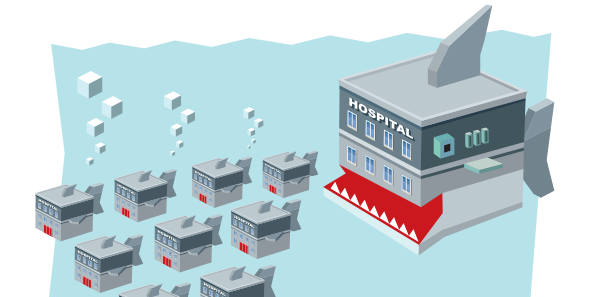
RI: If you’re looking at consolidating or merging or being acquired, you should be very careful with the partner that you pick. The point that Savoy made is important to keep in mind; there are physician-owned groups of all different kinds. As the former chair of the Democratic Group Practice Section, which Savoy is now the chair of, we struggled a lot, even internally, trying to define what a democratic physician group was. There is a large variety. Emergency Medical Associates, like CEP, is a very broadly owned group. There are other groups that are owned by one person. The impact of the sale of each of those groups is very different from the others. In EMA, we always had to take whatever number that somebody would be willing to offer and divide it by our number of partners. Years ago, when Jay was in the group, I think it was split by 60. A few years ago, when we talked about it, it was 200. This year, when we finally did it, I think it was 250. The payment looks big, but when you divide it by 250, nobody’s retiring. It’s not that kind of money. The reasons we did it has something more to do with that change. There was this equation that was always done, and it was never enough money to make it worthwhile for us to do it just for the money. This time, we decided to join EmCare, and there were other things that we talked about strategically that we felt were more important. If you’re one or two people and you own a contract with four or five hospitals, you’ll be offered a lot of money.
Explore This Issue
ACEP Now: Vol 35 – No 02 – February 2016JK: Can I make two comments, Ricardo? Number one, it can benefit you if you have had a cantankerous relationship with your hospitalists and, all of a sudden, you and your hospitalists are part of the same group. We found that it really helps to facilitate communication and patient flow when you have the same ethos and culture among the emergency physicians and the hospitalists. The second is a little bit more conceptual. Do you want the doctors that you work with to feel like owners, or do you want them to feel like renters? There is a difference between an owner and a renter and between being a winner and a whiner. Whiners only complain about things; they come in, they do their hours, and then they leave. Winners take responsibility for issues. If a problem comes up, they’re going to fix it; they’re not going to run off and let somebody else fix it. However you accomplish this, whether you’re part of a large group or whether you’re part of a small group, we want our doctors to feel like owners. When many of us first went into practice, the model was that emergency physicians felt like cowboys. As cowboys, we come in, do our hours, and the rest of the time you spend on the beach, spend in the mountains trekking, or whatever else you’d like to do. That’s changed. Now, if we’re going to be successful as emergency physicians, we really have to become integral parts of the social fabric of our hospitals. The only way to do that is to make people feel like we’re owners in whatever model. If becoming a part of a large group through a merger or acquisition can help you feel more like you have a piece of the rock, fine. If it doesn’t and if it moves away from that, then ultimately it’s going to be harmful.
I don’t think it matters whether you’re the acquired or the acquirer. It’s about going into it with the willingness to have your culture change. Because no matter how similar you are, there are differences. —Ray Iannaccone, MD, FACEP
BA: I think these are great comments. I love the theme of ownership. There are large systems that are clearly just on a scale-and-leverage play. It’s just grow, grow, grow, and we can get another ounce of cost reduction out of our fixed infrastructure by adding the revenue of additional organizations. It is just about balance sheet finances and operating infrastructure scale and leverage. I don’t think they’re ultimately going to win because if you stretch that out between states and become these giant organizations on the hospital side, it’s really going to be difficult without engaging physicians as operators in clinical redesign. That is where the next huge treasure trove of cost reduction is in hospital operations in this country, and it’s going to result in much better outcomes. You can’t get that without engagement and ownership of physicians and their leadership, whether they’re part of your system from an employment standpoint or contractual relationship. That’s what we’re striving for. It’s a journey; we’re not there yet, but that is the model that will beat consolidation and growth for scale and leverage at all cost.
Pages: 1 2 3 4 5 | Single Page





No Responses to “Emergency Medicine Leaders Discuss Mergers, Acquisitions at ACEP15 Council Town Hall”